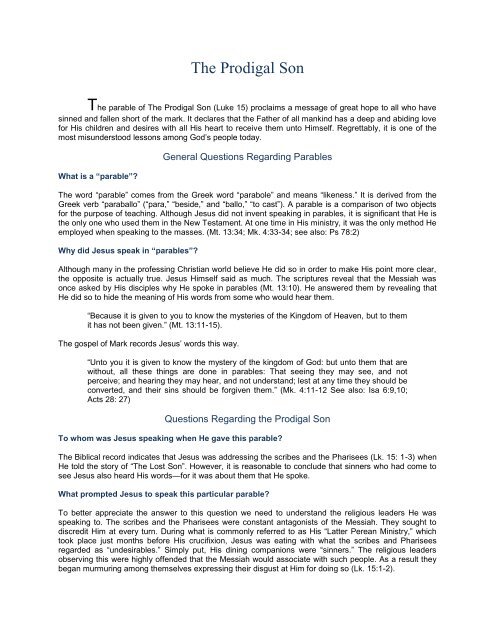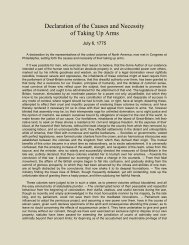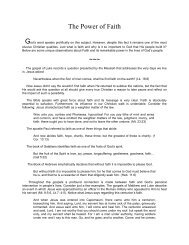The Prodigal Son - Blow the Trumpet
The Prodigal Son - Blow the Trumpet
The Prodigal Son - Blow the Trumpet
Create successful ePaper yourself
Turn your PDF publications into a flip-book with our unique Google optimized e-Paper software.
<strong>The</strong> <strong>Prodigal</strong> <strong>Son</strong><br />
<strong>The</strong> parable of <strong>The</strong> <strong>Prodigal</strong> <strong>Son</strong> (Luke 15) proclaims a message of great hope to all who have<br />
sinned and fallen short of <strong>the</strong> mark. It declares that <strong>the</strong> Fa<strong>the</strong>r of all mankind has a deep and abiding love<br />
for His children and desires with all His heart to receive <strong>the</strong>m unto Himself. Regrettably, it is one of <strong>the</strong><br />
most misunderstood lessons among God’s people today.<br />
What is a “parable”<br />
General Questions Regarding Parables<br />
<strong>The</strong> word “parable” comes from <strong>the</strong> Greek word “parabole” and means “likeness.” It is derived from <strong>the</strong><br />
Greek verb “paraballo” (“para,” “beside,” and “ballo,” “to cast”). A parable is a comparison of two objects<br />
for <strong>the</strong> purpose of teaching. Although Jesus did not invent speaking in parables, it is significant that He is<br />
<strong>the</strong> only one who used <strong>the</strong>m in <strong>the</strong> New Testament. At one time in His ministry, it was <strong>the</strong> only method He<br />
employed when speaking to <strong>the</strong> masses. (Mt. 13:34; Mk. 4:33-34; see also: Ps 78:2)<br />
Why did Jesus speak in “parables”<br />
Although many in <strong>the</strong> professing Christian world believe He did so in order to make His point more clear,<br />
<strong>the</strong> opposite is actually true. Jesus Himself said as much. <strong>The</strong> scriptures reveal that <strong>the</strong> Messiah was<br />
once asked by His disciples why He spoke in parables (Mt. 13:10). He answered <strong>the</strong>m by revealing that<br />
He did so to hide <strong>the</strong> meaning of His words from some who would hear <strong>the</strong>m.<br />
“Because it is given to you to know <strong>the</strong> mysteries of <strong>the</strong> Kingdom of Heaven, but to <strong>the</strong>m<br />
it has not been given.” (Mt. 13:11-15).<br />
<strong>The</strong> gospel of Mark records Jesus’ words this way.<br />
“Unto you it is given to know <strong>the</strong> mystery of <strong>the</strong> kingdom of God: but unto <strong>the</strong>m that are<br />
without, all <strong>the</strong>se things are done in parables: That seeing <strong>the</strong>y may see, and not<br />
perceive; and hearing <strong>the</strong>y may hear, and not understand; lest at any time <strong>the</strong>y should be<br />
converted, and <strong>the</strong>ir sins should be forgiven <strong>the</strong>m.” (Mk. 4:11-12 See also: Isa 6:9,10;<br />
Acts 28: 27)<br />
Questions Regarding <strong>the</strong> <strong>Prodigal</strong> <strong>Son</strong><br />
To whom was Jesus speaking when He gave this parable<br />
<strong>The</strong> Biblical record indicates that Jesus was addressing <strong>the</strong> scribes and <strong>the</strong> Pharisees (Lk. 15: 1-3) when<br />
He told <strong>the</strong> story of “<strong>The</strong> Lost <strong>Son</strong>”. However, it is reasonable to conclude that sinners who had come to<br />
see Jesus also heard His words—for it was about <strong>the</strong>m that He spoke.<br />
What prompted Jesus to speak this particular parable<br />
To better appreciate <strong>the</strong> answer to this question we need to understand <strong>the</strong> religious leaders He was<br />
speaking to. <strong>The</strong> scribes and <strong>the</strong> Pharisees were constant antagonists of <strong>the</strong> Messiah. <strong>The</strong>y sought to<br />
discredit Him at every turn. During what is commonly referred to as His “Latter Perean Ministry,” which<br />
took place just months before His crucifixion, Jesus was eating with what <strong>the</strong> scribes and Pharisees<br />
regarded as “undesirables.” Simply put, His dining companions were “sinners.” <strong>The</strong> religious leaders<br />
observing this were highly offended that <strong>the</strong> Messiah would associate with such people. As a result <strong>the</strong>y<br />
began murmuring among <strong>the</strong>mselves expressing <strong>the</strong>ir disgust at Him for doing so (Lk. 15:1-2).
At this point it is also important to understand that <strong>the</strong>se religious leaders were brazenly arrogant. <strong>The</strong>y<br />
would often tout <strong>the</strong>ir own righteousness while at <strong>the</strong> same time condemn o<strong>the</strong>rs. In <strong>the</strong> parable of “<strong>The</strong><br />
Pharisee and <strong>the</strong> Publican” (Lk. 18:10-14), a Pharisee actually belittles a tax collector when praying to <strong>the</strong><br />
Fa<strong>the</strong>r in heaven. During this prayer this religious leader had <strong>the</strong> audacity to thank God that he (<strong>the</strong><br />
Pharisee) was not like all <strong>the</strong> wretched people around him.<br />
Now, once again, as <strong>the</strong>y witness Jesus showing compassion to those whose lives were scared by bad<br />
decisions and hard living, <strong>the</strong>se “pious” men declare <strong>the</strong>ir disdain for those who sought out <strong>the</strong> Messiah.<br />
<strong>The</strong>y see no redeeming qualities in <strong>the</strong>se people. Fur<strong>the</strong>rmore, <strong>the</strong>y see Jesus’ lack of discernment as<br />
fur<strong>the</strong>r evidence that He is not a true man of God.<br />
This is clearly what was taking place at this moment. In essence <strong>the</strong>se spiritual pillars of Judaism were<br />
doing three things: 1) <strong>The</strong>y were asserting <strong>the</strong>ir own righteousness. 2) <strong>The</strong>y were condemning o<strong>the</strong>rs<br />
who clearly had some serious flaws in <strong>the</strong>ir lives and, 3) <strong>the</strong>y were questioning <strong>the</strong> wisdom of Jesus for<br />
showing compassion to such people while at <strong>the</strong> same time failing to show honor to <strong>the</strong>m.<br />
Jesus responded to this by offering a trilogy of parables in which <strong>the</strong> first two (“<strong>The</strong> Lost Sheep” and “<strong>The</strong><br />
Lost Coin”) expose <strong>the</strong> hypocrisy of <strong>the</strong> Pharisees grumblings. <strong>The</strong> third parable <strong>the</strong>n presents <strong>the</strong>m with<br />
a chilling reality of how distant <strong>the</strong>ir judgement was from that of God’s. In <strong>the</strong> parable of “<strong>The</strong> <strong>Prodigal</strong><br />
<strong>Son</strong>” Jesus tells a story about a sinner who repents, a fa<strong>the</strong>r who forgives, and a bro<strong>the</strong>r who 1) asserts<br />
his own righteousness, 2) condemns his sibling for past mistakes and 3) questions <strong>the</strong> wisdom of a fa<strong>the</strong>r<br />
for showing mercy to a sinner while at <strong>the</strong> same time failing to show honor to him. While some in God’s<br />
church hold up <strong>the</strong> older bro<strong>the</strong>r as a model of honor to a fa<strong>the</strong>r, he is in fact nothing but a resentful child<br />
that cared little about anything but himself.<br />
What evidence in this parable suggests that <strong>the</strong> fa<strong>the</strong>r knew his lost son would ultimately return<br />
home<br />
Three Reasons<br />
<strong>The</strong>re are certain things that occur in this story that suggests <strong>the</strong> fa<strong>the</strong>r anticipated <strong>the</strong> return of his son.<br />
First, <strong>the</strong> fa<strong>the</strong>r saw his son “when he was still a great way off” (Lk. 15:20). This being <strong>the</strong> case, how<br />
could he even recognize his son at such a great distance How could he know that <strong>the</strong> small figure on <strong>the</strong><br />
horizon was actually his child In truth a loving parent can easily do this without difficulty. Anyone who<br />
has had children can attest to this. You may not recognize friends or acquaintances from a distance but<br />
your own child is something far different. A loving parent is so profoundly connected to his children that<br />
he can recognize <strong>the</strong>m in a crowd. However, this brings us to ano<strong>the</strong>r question: why was <strong>the</strong> fa<strong>the</strong>r<br />
looking out on <strong>the</strong> horizon in <strong>the</strong> first place <strong>The</strong>re can be only one answer. He was looking out in <strong>the</strong><br />
hope of seeing <strong>the</strong> son he loved so dearly. Something in him just knew his child would come home. But<br />
<strong>the</strong>re is more.<br />
A Second Reason<br />
<strong>The</strong> powerful story Jesus tells indicates that <strong>the</strong> fa<strong>the</strong>r was “moved with compassion” and ran out to meet<br />
his son (Lk. 15:20). <strong>The</strong> word compassion in this verse implies pity. <strong>The</strong> question we need to ask<br />
ourselves is why would <strong>the</strong> fa<strong>the</strong>r pity a son he had only seen from a great distance What would make<br />
him think his son would even need his pity<br />
<strong>The</strong> implication although not stated directly, is that <strong>the</strong> fa<strong>the</strong>r knew that <strong>the</strong> world to which his son had<br />
gone would be treacherous and evil. As such it had <strong>the</strong> potential to cause his child great harm. Because<br />
he had a keen awareness of both his son and <strong>the</strong> world in which he was going, <strong>the</strong> fa<strong>the</strong>r rightly<br />
anticipated <strong>the</strong> result. Many parents today can identify with this. <strong>The</strong>y see <strong>the</strong>ir children boldly pursue<br />
things that <strong>the</strong>y (<strong>the</strong> parents) know will only bring pain and heartache.
It is clear that <strong>the</strong> fa<strong>the</strong>r allowed his son to go into that world in order to learn a lesson that could not be<br />
fully appreciated by staying at home. Although <strong>the</strong> son left <strong>the</strong> fa<strong>the</strong>r’s estate of his own volition, he did so<br />
with his fa<strong>the</strong>r’s consent. This is not unlike God’s children today. Many have left <strong>the</strong> faith only to return<br />
again and seek out God’s forgiveness and mercy. God is not surprised when His children return. He is<br />
filled with joy.<br />
A Third Reason<br />
Ano<strong>the</strong>r indication that <strong>the</strong> fa<strong>the</strong>r knew his son would return is that he had a fatted calf ready to be<br />
slaughtered for a great feast (Lk. 15:23). This being <strong>the</strong> case it is reasonable to think that <strong>the</strong> fa<strong>the</strong>r must<br />
have anticipated a celebration would be held. <strong>The</strong> lesson for God’s people today is that <strong>the</strong> Fa<strong>the</strong>r knows<br />
His children so well that He can plan for <strong>the</strong>ir return even when it doesn't look like <strong>the</strong>re will be such an<br />
event. With this said, imagine what He has in store for us.<br />
Was <strong>the</strong> older son justified in feeling cheated by his fa<strong>the</strong>r<br />
According to <strong>the</strong> parable, <strong>the</strong> older bro<strong>the</strong>r was angry with his fa<strong>the</strong>r for honoring a son that he (<strong>the</strong> older<br />
bro<strong>the</strong>r) believed deserved no honor. This resentment was driven by nothing o<strong>the</strong>r than selfishness,<br />
which is never justified. If one thinks about it, <strong>the</strong> older sibling was reflecting <strong>the</strong> same attitude as <strong>the</strong><br />
religious leaders Jesus was speaking to. <strong>The</strong>y too were offended that Jesus would dine with highly flawed<br />
people. Obviously, Jesus wasn’t.<br />
Note: One of <strong>the</strong> great mistakes made by many of God’s people today is to sympathize<br />
with <strong>the</strong> older bro<strong>the</strong>r. Some believe that this parable actually vindicates him because <strong>the</strong><br />
balance of <strong>the</strong> estate will go to him. <strong>The</strong> question we must consider is what ultimately<br />
happens to <strong>the</strong> prodigal Is he left with nothing <strong>The</strong> answer to this question is revealed<br />
in <strong>the</strong> gifts <strong>the</strong> fa<strong>the</strong>r bestowed on him.<br />
What is <strong>the</strong> significance of <strong>the</strong> gifts (sandals, a coat, and a ring) <strong>the</strong> fa<strong>the</strong>r bestowed on his son<br />
after his return home<br />
According to <strong>the</strong> parable, <strong>the</strong> fa<strong>the</strong>r ran out to embrace his son <strong>the</strong> moment he saw him. <strong>The</strong> lesson we<br />
can learn from this is that as soon as a sinner’s face is turned homeward, even though he may still be far<br />
away, our Fa<strong>the</strong>r in heaven recognizes this change of heart, and bounds out to meet <strong>the</strong> child He so<br />
dearly loves. God doesn’t say, “Let this sinner come to Me and beg for my mercy.” On <strong>the</strong> contrary God<br />
moves quickly with delight when He sees a child return to Him.<br />
Additionally <strong>the</strong> fa<strong>the</strong>r fell on his son’s neck and kissed him (v 20). Consider what must be taking place<br />
here. <strong>The</strong> son was unquestionably filthy. <strong>The</strong> smell of garbage and pig slop must have been intense. But<br />
did <strong>the</strong> fa<strong>the</strong>r care Of course not! His son was a WONDERFUL sight to Him and nothing could diminish<br />
that.<br />
Four exquisite Gifts<br />
When <strong>the</strong> prodigal returns in tears to his fa<strong>the</strong>r, he begs him to allow him to work as a servant on <strong>the</strong><br />
family estate. But <strong>the</strong> fa<strong>the</strong>r would have none of this. His reaction speaks volumes about how God views<br />
genuine contrition and repentance. This wonderful patriarch provides his son with exquisite gifts—each of<br />
which tells an extraordinary story of distinction and honor.<br />
“Put sandals on his feet”<br />
<strong>The</strong> sandals picture freedom. Slaves at that time were barefoot. And although <strong>the</strong> prodigal wanted to be a<br />
servant, <strong>the</strong> fa<strong>the</strong>r saw him as much more. He was a son and his fa<strong>the</strong>r cherished him greatly. It is<br />
interesting that although God’s people are referred to as servants (Rev. 7:3), <strong>the</strong>y too are much more. At<br />
<strong>the</strong> end of His life Jesus called His disciples “friends” (Jn. 15:15). Ultimately <strong>the</strong>y will be His bride.
“Put a ring on his finger”<br />
<strong>The</strong> Bible also indicates that God’s people are to hold positions of great distinction in His kingdom (Rev.<br />
5:10). <strong>The</strong>y will actually sit on thrones and govern <strong>the</strong> entire world (Rev. 20:4). This wonderful truth is also<br />
captured in <strong>the</strong> story of “<strong>The</strong> <strong>Prodigal</strong> <strong>Son</strong>.” When his repentant son returns, his fa<strong>the</strong>r gives him a ring. A<br />
ring is a symbol of power and authority (Est. 8:10). It actually carries <strong>the</strong> weight of <strong>the</strong> one who gives it.<br />
Pharaoh bestowed such an honor on Joseph (Gen. 41:41-42). And God Almighty will do <strong>the</strong> same to His<br />
bride.<br />
“Bring him <strong>the</strong> best robe”<br />
In addition to giving his son sandals and a ring, this loving fa<strong>the</strong>r directed his servants to bring him a coat.<br />
But not just any coat. It had to be <strong>the</strong> very finest for his dear son (Lk.15: 22). <strong>The</strong> scriptures speak<br />
prolifically concerning <strong>the</strong> significance of garments. Bestowing such a gift was not only a sign of<br />
distinction and honor, but also a reflection of intimacy and affection. Jacob set his son Joseph apart from<br />
his o<strong>the</strong>r children with an exquisite garment (Gen. 37: 3). Hannah, <strong>the</strong> mo<strong>the</strong>r of Samuel also brought her<br />
son a coat every year when he served in <strong>the</strong> temple under Eli (1Sam. 2: 19). Mordecai was also given<br />
this distinction (Es<strong>the</strong>r 8:15).<br />
But why would <strong>the</strong> fa<strong>the</strong>r give such an important gift to a son who had brought such great shame on <strong>the</strong><br />
family This is a question that must have been on <strong>the</strong> lips of older bro<strong>the</strong>r. <strong>The</strong> reason can only be that<br />
<strong>the</strong> fa<strong>the</strong>r saw a state of heart in his son that was worthy of honor. <strong>The</strong> book of Zechariah records that<br />
God does this very thing to <strong>the</strong> priest Joshua (Zech. 3:4-5). Although we may not fully grasp God’s desire<br />
to raise up <strong>the</strong> fallen, it is a part of His nature never <strong>the</strong> less.<br />
He raiseth up <strong>the</strong> poor out of <strong>the</strong> dust, and lifteth up <strong>the</strong> beggar from <strong>the</strong> dunghill, to set<br />
<strong>the</strong>m among princes, and to make <strong>the</strong>m inherit <strong>the</strong> throne of glory: for <strong>the</strong> pillars of <strong>the</strong><br />
earth are <strong>the</strong> LORD's, and he hath set <strong>the</strong> world upon <strong>the</strong>m. (1 Sam.2: 8)<br />
A Great Feast<br />
<strong>The</strong> last gift <strong>the</strong> fa<strong>the</strong>r bestows on his son is a great celebration. <strong>The</strong> joy of his return just had to be<br />
shared with o<strong>the</strong>rs. Now consider <strong>the</strong> significance of this act as it pertains to those who repent and appeal<br />
to God for mercy. <strong>The</strong> book of Revelation provides a brief glimpse into a wonderful celebration given in<br />
honor of Christ and His bride.<br />
And a voice came out of <strong>the</strong> throne, saying, Praise our God, all ye his servants, and ye that fear him, both<br />
small and great. And I heard as it were <strong>the</strong> voice of a great multitude, and as <strong>the</strong> voice of many waters,<br />
and as <strong>the</strong> voice of mighty thunderings, saying, Alleluia: for <strong>the</strong> Lord God omnipotent reigneth. Let us be<br />
glad and rejoice, and give honor to him: for <strong>the</strong> marriage of <strong>the</strong> Lamb is come, and his wife hath made<br />
herself ready. And to her was granted that she should be arrayed in fine linen, clean and white: for <strong>the</strong><br />
fine linen is <strong>the</strong> righteousness of saints. And he saith unto me, Write, Blessed are <strong>the</strong>y which are called<br />
unto <strong>the</strong> marriage supper of <strong>the</strong> Lamb.<br />
This great wedding is a celebration of redemption’s victory over sin. It is arguably <strong>the</strong> happiest moment in<br />
history. Although <strong>the</strong> scribes and Pharisees could not grasp how <strong>the</strong> bride makes herself ready, Jesus<br />
could. Those sinners who sought out <strong>the</strong> Messiah took a monumental step in that direction. Jesus knew<br />
precisely what was taking place when He received <strong>the</strong>se prodigals that sought Him. He also knew that<br />
His Fa<strong>the</strong>r in Heaven was preparing a wonderful array of gifts for <strong>the</strong>m. Included among <strong>the</strong>se gifts was a<br />
ring, a beautiful garment, a pair of sandals and a great feast.<br />
Based on this parable, do you think a person can lose (squander) part of his reward<br />
<strong>The</strong>re are many sincere members in God’s Church that argue this very point. <strong>The</strong>y do so based on <strong>the</strong><br />
fact that in <strong>the</strong> parable, <strong>the</strong> younger bro<strong>the</strong>r squandered his inheritance, while <strong>the</strong> older bro<strong>the</strong>r had not
yet received his portion of <strong>the</strong> estate. Fur<strong>the</strong>rmore, <strong>the</strong> words of <strong>the</strong> fa<strong>the</strong>r declared that <strong>the</strong> balance of<br />
<strong>the</strong> estate would go to <strong>the</strong> oldest son: “<strong>Son</strong>, you art ever with me, and all that I have is yours” (Lk. 15:31).<br />
With this said, it is important to understand that what is mentioned here is an “inheritance” not a reward.<br />
Ostensibly what <strong>the</strong> fa<strong>the</strong>r was telling <strong>the</strong> older son was “Why are you so angry You have lost nothing.”<br />
For those who believe this parable stands as proof that one can lose his reward by walking away from <strong>the</strong><br />
faith and later genuinely repenting and coming back, consider <strong>the</strong> following question. Can someone<br />
actually receive his reward during this life, because that is what would have to take place according to <strong>the</strong><br />
parable In o<strong>the</strong>r words can you name something a loyal member of God's Church could receive in <strong>the</strong><br />
Kingdom that was already given to a former member of God's Church during this life<br />
"My Reward is With Me"<br />
<strong>The</strong> Bible tells us that Jesus will bring His reward with Him, not give it out to those who want it now. This<br />
being <strong>the</strong> case, we need to understand what is truly taking place in this parable. In truth, Jesus is not<br />
talking about rewards or even inheritances for that matter. He is talking about mercy triumphing over<br />
judgement. God <strong>the</strong> Fa<strong>the</strong>r is <strong>the</strong> merciful One. <strong>The</strong> Pharisees and <strong>the</strong> older bro<strong>the</strong>r are <strong>the</strong> ones who<br />
resent mercy.<br />
<strong>The</strong> mistake being made by many in God's Church today is that <strong>the</strong>y read something into <strong>the</strong> story that<br />
has nothing to do with <strong>the</strong> point Jesus was making when giving it in <strong>the</strong> first place. <strong>The</strong> Messiah’s point is<br />
that God is a loving Fa<strong>the</strong>r who desires with all His heart to FORGIVE His children. When He does, <strong>the</strong>y<br />
are made whole—with all <strong>the</strong> privileges of a member of <strong>the</strong> family. To those who sympathize more with<br />
<strong>the</strong> older bro<strong>the</strong>r consider what truly lies ahead for <strong>the</strong>se two sons if nothing changes from this point.<br />
In reality <strong>the</strong> ultimate fate of <strong>the</strong> prodigal will be far greater than that of <strong>the</strong> older bro<strong>the</strong>r, and for good<br />
reason. <strong>The</strong> prodigal will occupy a position of great authority in <strong>the</strong> Kingdom because he can fully<br />
appreciate <strong>the</strong> value of mercy. That is <strong>the</strong> POINT! <strong>The</strong> prodigal is <strong>the</strong> one who will sit on a throne in <strong>the</strong><br />
Kingdom—because he will judge like his Fa<strong>the</strong>r judges.<br />
Here is one last thing to consider: Who do you think would make a better judge in God’s Kingdom, <strong>the</strong><br />
older bro<strong>the</strong>r or <strong>the</strong> <strong>Prodigal</strong> <strong>The</strong> answer should be obvious.<br />
A Final Thought<br />
It is interesting that <strong>the</strong> fa<strong>the</strong>r in this parable actually went out to meet both of his sons. <strong>The</strong> reaction of<br />
<strong>the</strong> younger was to beg for his fa<strong>the</strong>r’s forgiveness and to tell him that from this day on he would comply<br />
with all of <strong>the</strong> fa<strong>the</strong>r’s desires. He would even be his slave.<br />
However, <strong>the</strong> reaction of <strong>the</strong> older bro<strong>the</strong>r was much different. When his fa<strong>the</strong>r came out and implored<br />
him to come into <strong>the</strong> house, he would not. In essence, he refused to honor his fa<strong>the</strong>r’s desire to rejoice<br />
with him. <strong>The</strong> irony of this is too powerful to ignore. As <strong>the</strong> story ends <strong>the</strong> older bro<strong>the</strong>r has now become<br />
a prodigal himself while <strong>the</strong> younger is once again a son.






